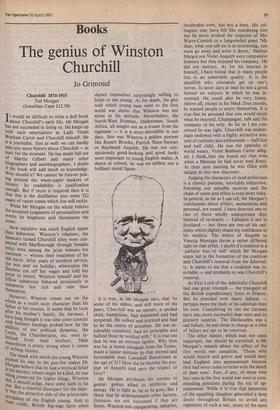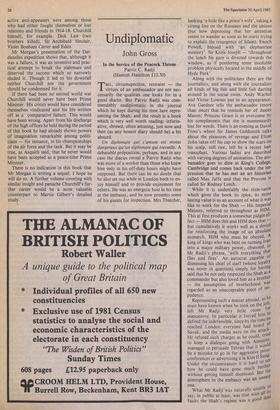Books
The genius of Winston Churchill
Jo Grimond
Churchill: 1874-1915 Ted Morgan (Jonathan Cape £12.50)
It would be difficult to write a dull book about Churchill's early life. Mr Morgan has not succeeded in doing so. He keeps up with such entertainers as Lady Violet Bonham Carter and Churchill himself. He is a journalist. Just as well: we can hardly take any more history about Churchill — at least for the moment. He has made full use Of Martin Gilbert and many other biographers and autobiographers. I doubt if his book will add much to knowledge. Why should it? We cannot be forever pok- ing around the waste-paper basketsof history. Its readability is justification enough. But if more is required then it is that this is the distillation into some 522 Pages of vaster tomes which few will tackle.
While Mr Morgan on the whole follows the accepted judgments of personalities and events he heightens and illuminates the scene.
How repulsive was much English upper class behaviour. Winston's relations, the Spencers turned Churchill (they were con- nected with Marlborough through females Only) were among the prize winners for nastiness — witness their treatment of his old nurse. After years of excellent service, she was sent on holiday; whereupon the Duchess cut off her wages and told her never to return. Winston himself and his fellow subalterns behaved atrociously to subalterns less rich and vain than themselves.
However, Winston comes out on the whole as a much nicer character than his father or his cousins. It seems that he took after his mother's family, the Jeromes. I have long thought it was time some scientist .
feminist leanings probed how far the abilities of our political dynasties, the ,L:e.ils, the Chamberlains, etc. were in- herited from their mothers. Male chauvinism is pretty strong when it comes to writing history.
The cheek with which the young Winston hushed his way to the gun-fire makes Mr
Organ believe that he had a mystical belief in his destiny; others might be killed, he was being preserved for higher things. Winston d, should judge, have some faith in his star. ar. But a cheerful disrespect for the elder- ': was the attractive side of the aristocratic hr?gance of the English young. And to
eir credit, British big-wigs have often shown themselves surprisingly willing to listen to the young. As for death, the glee with which young men went to the first world war shows that Winston was not alone in his attitude. Nevertheless, the North-West Frontier, Ondersman, South Africa, all sought out as a truant from his regiment — it is a story incredible in our days. Nor was Winston a golden portent like Rupert Brooke, Patrick Shaw-Stewart or Raymond Asquith. He was not con- spicuously good-looking and good looks were important to young English males. A dunce at school, he was no athlete nor a brilliant social figure.
It is true, as Mr Morgan says, that `to some of his elders, and still more of his peers, Churchill was an upstart, a spoiled child, bumptious, bad mannered and bad tempered. He sulked and stormed and had to be the centre of attention. He was in- tolerably conceited, had no principles and bullied those he worked with.' It is true too that he was an extreme egotist. Why then was he, a recent renegade from the Tories, made a junior minister by that shrewd and formidable man Campbell Bannerman at the age of 31? How did he become the pro- tege of Asquith and earn the respect of Grey?
Mr Morgan attributes his success to genius: genius allied to ambition and energy. He is right as far as he goes. But I think that he underestimates other factors. Geniuses are not welcomed if they are bores. Winston was exasperating, talkative, intolerable even, but not a bore. His col- leagues may have felt like murdering him but he never evoked the response of Mrs Warre-Cornish to a longwinded guest 'My dear, what you tell me is so interesting, you must go away and write it down.' Neither Margot nor Violet Asquith were compulsive listeners but they enjoyed his company. He did not instruct. As for his interest in himself, I have found that in many people this is an admirable quality. It is the unselfish who ultimately get on one's nerves. In latter days at least he was a good listener on subjects in which he was in- terested. He could also be very funny. Above all, except in his black Zeus moods, he wanted people to enjoy themselves. It is true that he assumed that you would enjoy what he enjoyed, Champagne, talk and the company of his wife. As far as I am con- cerned he was right. Churchill was endear- ingly endowed with a highly attractive mix- ture of curiosity and enthusiasm — half lion and half child. He was the opposite of world weary. Violet Bonham Carter alleg- ed, I think, that she found out that even when a Minister he had never read Keats. At their next meeting he was filled with delight at this new discovery.
Judging the characters of dead politicians is a chancy pastime, inevitably subjective. Ferreting out possible motives and the chain of cause and effect is even more risky. In general, as far as I can tell, Mr Morgan's conclusions about affairs, momentous and personal, are sound. I have detected one or two of those wholly unimportant slips beloved of reviewers — Fallodon is not in Scotland — but there are two of his opi- nions which slightly shake my confidence in his verdicts. The letters of Asquith to Venetia Montagu throw a rather different light on that affair. I doubt if it resulted in a 'pathetic loss of will' which Mr Morgan states led to the formation of the coalition and Churchill's removal from the Admiral- ty. It seems to me that a coalition was in- evitable — and probably so was Churchill's removal.
As First Lord of the Admiralty Churchill had one great triumph — the transport of the British expeditionary force to France. But he presided over many failures perhaps more the fault of his admirals than his own. Considering its size the German navy was more successful than ours and its gunnery superior. The Dardanelles was a sad failure. In war those in charge at a time of failure are apt to be removed.
The other matter, which may not seem important, but should be corrected, is Mr Morgan's remark about the effect of the first world war casualties. 'Those who would mourn and grieve and would later lead England into appeasement because they had never come to terms with the death of their sons'. Few, if any, of those who lost sons in the first world war were in com- manding positions during the era of ap- peasement. While it is true that memories of the appalling slaughter generated a deep desire throughout Britain to avoid any repetition of such a war, many of the most active anti-appeasers were among those who had either fought themselves or lost relations and friends in 1914-18. Churchill himself, for example. Dick Law (two brothers killed), Sir Archibald Sinclair, Violet Bonham Carter and Eden.
Mr Morgan's presentation of the Dar- danelles expedition shows that, although it was a failure, it was an inventive and prac- tical attempt to break the stalemate and deserved the success which so narrowly eluded it. Though it led to his downfall neither Churchill nor the government should be condemned for it.
If there had been no second world war Churchill would never have been Prime Minister. His critics would have considered themselves vindicated and his life written off as a comparative failure. This would have been wrong. Apart from his discharge of the high offices he held during the period of this book he had already shown powers of imagination remarkable among politi- cians — for instance, in his championships of the air force and the tank. But it may be true, as Asquith said, that he never would have been accepted as a peace-time Prime Minister.
There is no indication in this book that Mr Morgan is writing a sequel. I hope he will do so. A further volume covering with similar insight and panache Churchill's fur- ther career would be a most valuable counterpart to Martin Gilbert's detailed study.











































 Previous page
Previous page